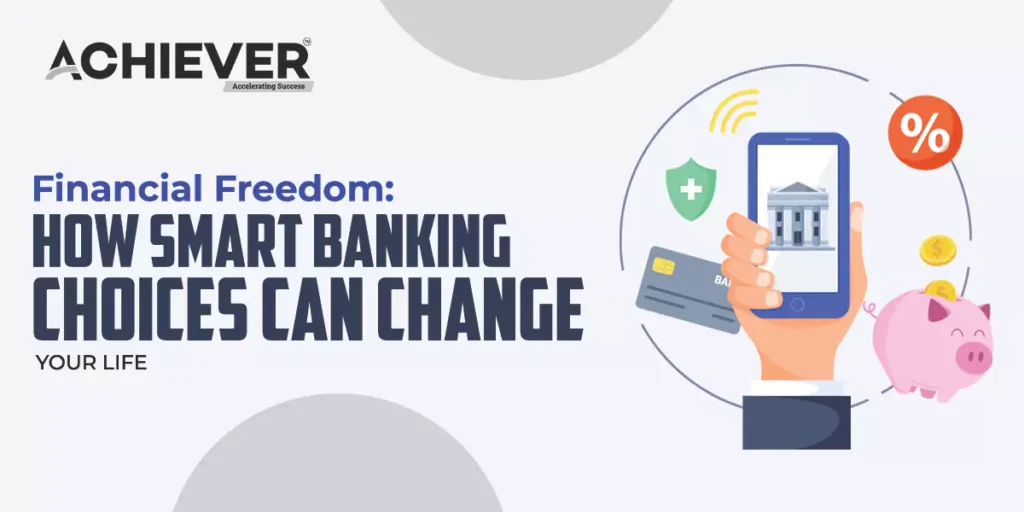Achieving financial freedom is about gaining control over your finances, so you can live life on your terms—without worrying about money. While this goal may seem far off, making smart banking choices can significantly impact your path to financial independence. By choosing the right bank accounts, eliminating debt, and using financial tools wisely, you can build a solid foundation for your future.
Here’s how smart banking decisions can help you reach financial freedom.
What Is Financial Freedom?
Financial freedom means having enough savings and investments to live comfortably, without relying on a paycheck. It’s about not stressing over bills, debts, or unexpected expenses. The road to this goal is paved with small, smart financial decisions that build up over time.
- Choose the Right Bank Accounts
Your choice of bank accounts matters more than you think. Having the right checking and savings accounts can make a huge difference in how quickly you can save and grow your money.
Checking Accounts: Look for Low Fees
A good checking account should have low or no fees, easy access to ATMs, and user-friendly online banking. Avoid accounts that charge unnecessary fees like overdraft or maintenance charges—these can eat into your savings over time.
Savings Accounts: Maximize Your Interest
A high-yield savings account is essential for building wealth. These accounts, often available through online banks, offer much higher interest rates than traditional savings accounts. This allows your money to grow passively while staying accessible for emergencies.
- Automate Your Savings
One of the best ways to consistently save money is by automating the process. Set up automatic transfers from your checking account to your savings account every month, even if it’s a small amount. This way, saving becomes a habit, not a choice you make on impulse.
By automating your savings, you ensure that you’re steadily building toward your financial goals without the temptation to spend.
- Use Financial Tools to Track Spending
Tracking your spending helps you understand where your money goes and identify areas where you can cut back. Most banks offer built-in budgeting tools or apps like Mint or You Need A Budget (YNAB) that sync with your accounts.
Using these tools, you can:
- Set monthly budget limits for categories like groceries, entertainment, and dining out.
- Monitor your spending habits, ensuring you’re not overspending in any area.
- Make better financial decisions by having a clear picture of your cash flow.
This practice keeps you disciplined and ensures your spending aligns with your financial goals.
- Avoid High-Interest Debt
Debt, especially high-interest debt like credit cards, can be a massive barrier to financial freedom. To minimize its impact:
- Pay off high-interest debt first: Focus on eliminating credit card debt and personal loans before tackling lower-interest obligations.
- Use balance transfers: If you have a lot of credit card debt, consider moving it to a card offering 0% interest for an introductory period to save on interest while paying off the balance.
Eliminating high-interest debt frees up more money for saving and investing, pushing you closer to financial freedom.
- Build an Emergency Fund
An emergency fund is essential for protecting yourself from unexpected financial setbacks like job loss or medical bills. Financial experts recommend saving 3 to 6 months’ worth of living expenses in a high-yield savings account.
Having an emergency fund helps you avoid taking on more debt in times of crisis, keeping you on track toward your goals.
- Take Advantage of Compound Interest
Compound interest allows your money to grow faster by earning interest on both the principal and the interest accumulated. The earlier you start saving, the more you benefit from this effect. Even small, regular contributions to savings or investment accounts can grow significantly over time.
To leverage compound interest:
- Start saving early: The more time your money has to grow, the better.
- Invest regularly: Consistent contributions to savings, 401(k)s, or IRAs can significantly increase your wealth over time.
- Invest for Growth
Once you’ve built up your savings and emergency fund, consider investing to grow your wealth faster. Banks often offer brokerage accounts, retirement accounts, and other tools to help you invest in stocks, bonds, or ETFs.
Investing can offer much higher returns than savings accounts, helping you reach your financial goals sooner. Even conservative investments like bonds or index funds can outpace inflation and grow your wealth over the long term.
Conclusion
Achieving financial freedom doesn’t happen overnight, but smart banking choices can put you on the right path. From selecting the right accounts and automating savings to eliminating debt and leveraging compound interest, each decision helps you gain control over your finances.
By taking small steps today, you can set yourself up for a future free from financial stress. The journey to financial freedom may take time, but with the right banking habits, it’s entirely within your reach.







